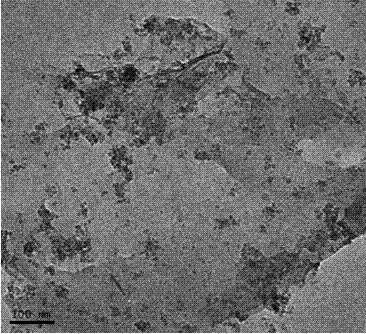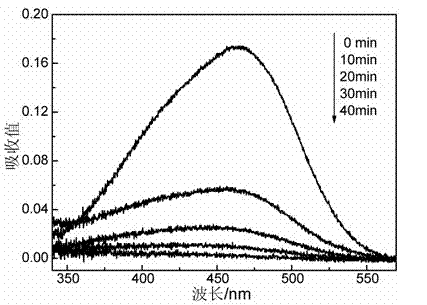Preparation method of graphene/titanium dioxide photocatalyst
A titanium dioxide and photocatalyst technology, applied in physical/chemical process catalysts, chemical instruments and methods, chemical/physical processes, etc., can solve problems such as difficulty in dispersion, avoid agglomeration, reduce the chance of impurities, and react quickly.
- Summary
- Abstract
- Description
- Claims
- Application Information
AI Technical Summary
Problems solved by technology
Method used
Image
Examples
Embodiment 1
[0027] A kind of preparation method of graphene / titanium dioxide photocatalyst, comprises the steps:
[0028] (1) To prepare solution A, slowly add 0.07 g of tetrabutyl titanate to 40 mL of chloroform at a concentration of 1.75 g / L; to prepare solution B, add 0.024 g of graphene oxide prepared by the Hummers method to 40 mL In the mixture of deionized water and ethanol, the concentration of graphene oxide was 0.6 g / L. The obtained mixed solution B was added dropwise into the solution A while stirring, and stirred evenly to obtain a mixed solution of A and B.
[0029] (2) Put the mixed solution of A and B into a hydrothermal kettle and keep it warm at 180°C for 12 hours; after natural cooling to room temperature, separate and wash to obtain a graphene / titanium dioxide photocatalyst with excellent photocatalytic performance.
[0030] Through transmission electron microscopy analysis, it can be seen that titanium dioxide nanoparticles are dispersed on graphene sheets, such as f...
Embodiment 2
[0032] A kind of preparation method of graphene / titanium dioxide photocatalyst, comprises the steps:
[0033] (1) To prepare solution A, slowly add 0.17 g of tetrabutyl titanate to 40 mL of chloroform at a concentration of 4.2 g / L; to prepare mixed solution B, add 0.008 g of graphene oxide prepared by the Hummers method to 40 mL In the mixed solution of deionized water and ethanol, the concentration of graphene oxide was 0.02 g / L. Add the mixed solution B dropwise to the solution A while stirring, and continue to stir and mix evenly to obtain a mixed solution of A and B.
[0034] (2) Put the mixed solution of A and B into a hydrothermal kettle and keep it warm at 160°C for 20 hours; after natural cooling to room temperature, separate and wash to obtain a graphene / titanium dioxide photocatalyst with excellent photocatalytic performance.
Embodiment 3
[0036] A kind of preparation method of graphene / titanium dioxide photocatalyst, comprises the steps:
[0037] (1) To prepare solution A, slowly add 0.034 g of tetrabutyl titanate to 40 mL of chloroform at a concentration of 0.85 g / L; to prepare mixed solution B, add 0.032 g of graphene oxide prepared by the Hummers method to 40 mL In the mixed solution of deionized water and ethanol, the concentration of graphene oxide was 0.8 g / L. The obtained mixed solution B was added dropwise into the solution A while stirring, and stirred evenly to obtain a mixed solution of A and B.
[0038] (2) Put the mixed solution of A and B into a hydrothermal kettle and keep it warm at 200°C for 5 hours; after natural cooling to room temperature, separate and wash to obtain a graphene / titanium dioxide photocatalyst with excellent photocatalytic performance.
[0039]
PUM
| Property | Measurement | Unit |
|---|---|---|
| concentration | aaaaa | aaaaa |
Abstract
Description
Claims
Application Information
 Login to View More
Login to View More - R&D
- Intellectual Property
- Life Sciences
- Materials
- Tech Scout
- Unparalleled Data Quality
- Higher Quality Content
- 60% Fewer Hallucinations
Browse by: Latest US Patents, China's latest patents, Technical Efficacy Thesaurus, Application Domain, Technology Topic, Popular Technical Reports.
© 2025 PatSnap. All rights reserved.Legal|Privacy policy|Modern Slavery Act Transparency Statement|Sitemap|About US| Contact US: help@patsnap.com


